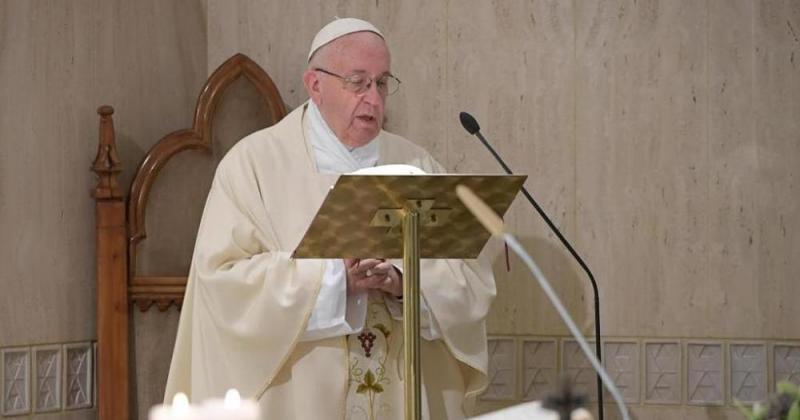In Santa Marta the Pope urged an examination of conscience: “Am I free, or am I a slave to my passions, ambitions, riches, or passing fancies?”
“Am I free, or am I a slave to my passions, ambitions, riches, or passing fancies? (It sounds like a joke, but how many people are fashion victims!)”. Let us reflect on our freedom in the midst of a ‘schizophrenic’ world. It shouts ‘Freedom, Freedom, Freedom!’ yet is really a slave.”
From the altar of the small chapel in Casa Santa Marta where he celebrates his usual morning mass, Pope Francis asks some crucial questions that challenge our conscience and push for a review of life. As Vatican News reports - the Pontiff speaks of three kinds of freedom - that Jesus gave us “through his redemptive act” on the Cross - to which correspond three examples, three witnesses from the readings of today’s liturgy: the Pharisee Gamaliel, the Apostles Peter and John, and Jesus himself.
Gamaliel, a Jew, a doctor of the law and a Pharisee, convinces the synod to free the apostles Peter and John, who were in prison for having healed a paralytic. He is, therefore, “a free man” because he can “reason with a clear mind”, to “convince others” about the fact that “time will take its toll”. “The free man is not afraid of time: he lets God do the work. He allows God to take His time. The free man is patient. [Gamaliel] was a Jew, not a Christian, and he had not recognized Jesus as the Savior. But he was a free man. He thought things out and offered his ideas to others who accepted them. Freedom is not impatient.” Francis emphasizes.
Pilate, for example, was also one who “reasoned well, with a clear mind”. He realized that Jesus was innocent, yet “he could not solve the problem, because he was not free, he wanted that promotion”, “He lacked the courage of freedom because he was a slave to his career, ambition, and success”.
The second example of freedom are Peter and John, who had healed the paralytic and found themselves before the Sanhedrin who finally frees them, yet after being whipped, despite being innocent. The two apostles were “unjustly punished”, the Pope explains, but “they left the Sanhedrin happy for having been judged worthy to suffer for the name of Jesus”. “This is the joy of imitating Jesus”, he comments, “it is another type of freedom: greater, wider, more Christian. Peter could have gone to court and sue the Sanhedrin. Yet instead he was joyful, like John because they had suffered in the name of Jesus. They were free in suffering, to follow Jesus”.
Christian attitude is just like that. It is saying: “Lord, you have given me so much, you have suffered so much for me. What can I do for you? Take, Lord, my life, my mind, my heart, everything is yours”. It is “the freedom of someone who loves Jesus Christ”, “even in our own day, there are many imprisoned and tortured Christians, who possess the freedom to profess Jesus Christ” the Pope observes.
He then moves on to the third example, Jesus himself. The Gospel tells of when he miraculously multiplied the loaves in the desert, thrilling the crowd to the point that “they had come to make him king”. But he withdrew back to the mountain: “He avoided triumphalism and was not fooled by it. He was free, since his freedom was to do the will of the Father”. Free as he was free in the desert in fighting against Satan’s temptations. Free to “follow the will of the Father”, ending up on the cross, Jesus is “the greatest example of freedom.” Pope Francis affirms.
He concludes by inviting us to think “about my freedom, our freedom. We have three examples: Gamaliel, Peter and John, and Jesus. Do I possess Christian freedom? Am I free, or am I a slave to my passions, ambitions, riches, or passing fancies? It seems like a joke, but many people are slaves to fashion! … Let us reflect on our freedom in the midst of a ‘schizophrenic’ world. It shouts ‘Freedom, Freedom, Freedom!’ but is really a slave. Let us reflect on the freedom that God gives us in Jesus”.
